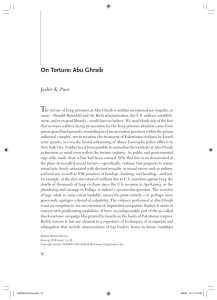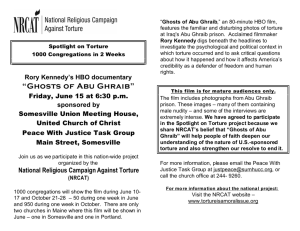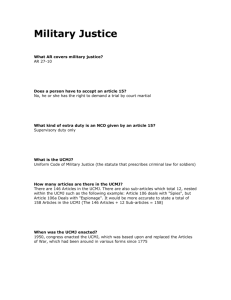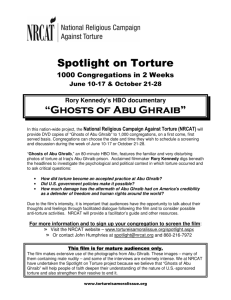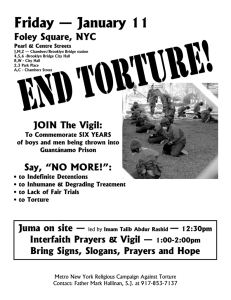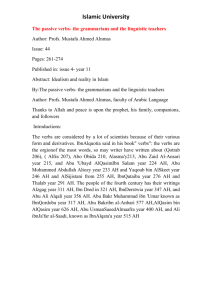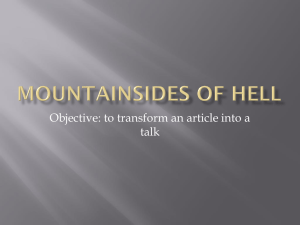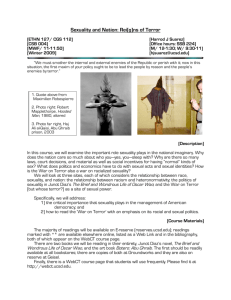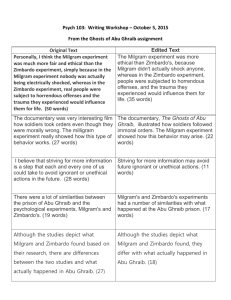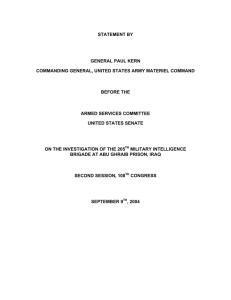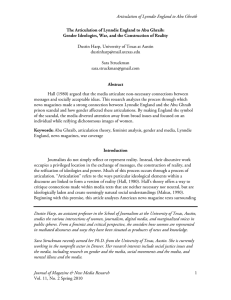Julia Hart
advertisement
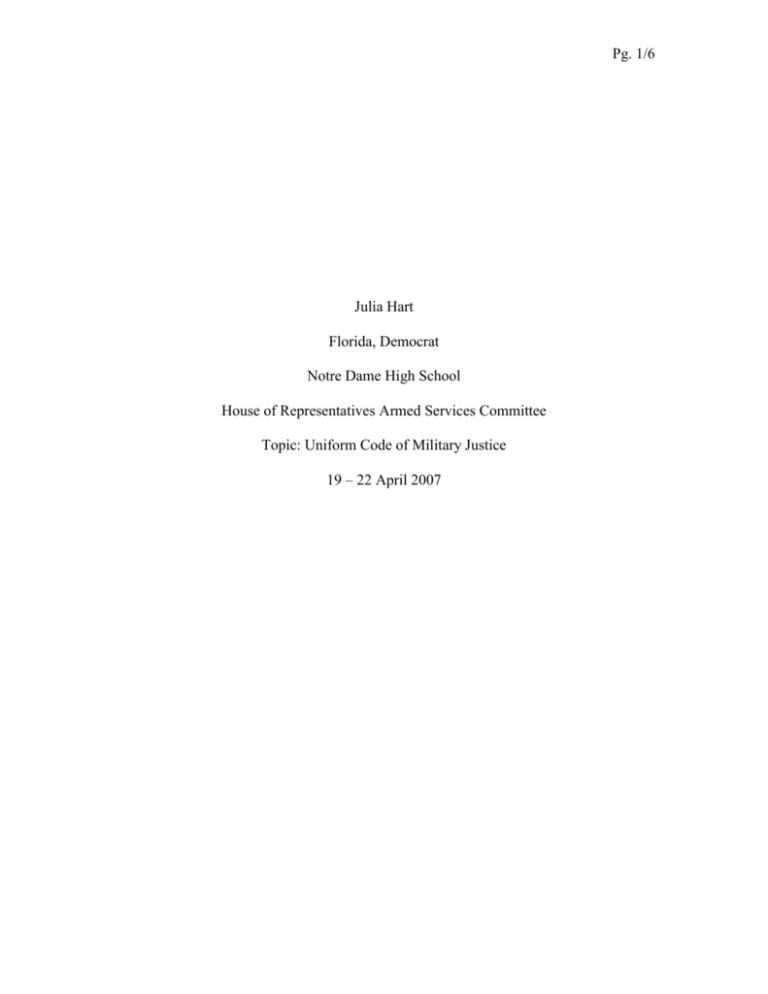
Pg. 1/6 Julia Hart Florida, Democrat Notre Dame High School House of Representatives Armed Services Committee Topic: Uniform Code of Military Justice 19 – 22 April 2007 Pg. 2/6 Uniform Code of Military Justice On May 5, 1950, President Truman singed the Uniform Code of Military Justice—UCMJ—into law as public law 81-506. Truman signed this law into effect because of post-World War II criticism of the justice system that worked with the military. This was in response to the demand for “a uniform system of courts” (Library of Congress p 1 of 2). The UCMJ was the “first set of laws and regulations for all branches of the military”. These laws put a limit on and acted as guidelines for the U.S. military both within the United States and when acting overseas. It affects all branches of the military in order to make the laws fair and consistent to all personnel in the U.S. military. There are problems that exist that deal with the UCMJ. Its codes and how they are enforced on the military affects how the military operates as a whole. The military has to be able to conduct themselves in a morally correct fashion, while abiding the UCMJ laws that are in place (Gieser, “Uniform Code” p 1 of 14). The UCMJ describes the restraint expected of military personnel, the non-judicial punishment of military personnel, the duties of court-martials (jurisdiction, composition, procedure before and during trial, sentences, and post-trial procedures and reviews), some punitive articles, and the duties of the Court of Military Appeals (Library of Congress p 2 of 2). The most recent significant event that had to do with the moral duty of military personnel was the prisoner abuse scandal at the Abu Ghraib prison in Iraq in 2004. Detainees were caught being beaten, stacked in pyramids naked, threatened by dogs, connected to wires, and put on leashes (Lawrence p 1 of 1). Many well-known Democratic politicians said that the abuse on the Abu Ghraib prisoners inflicted by American soldiers was on the same scale as what Saddam Hussein did to his prisoners. Pg. 3/6 “Senator Ted Kennedy said on the Senate floor that Abu Ghraib was simply ‘under new management: U.S. management.’” Al Gore called this prison abuse scandal a “Bush gulag” (O’Keefe p 1 of 1). The problem with this situation is the moral issue. Should military personnel be allowed to inflict harm on anybody just because they are “fighting” and doing what’s best for the country by taking people’s lives to make the world safer? Unfortunately, many do not take moral concerns into the big picture. That is why the United States government had to come up with guidelines and boundaries for what is right and what is wrong to do in this type of situation. The UCMJ clearly defines how a soldier in active duty should behave with concern to the way prisoners are treated. In response to the Abu Ghraib prisoner abuse scandal, lower-level soldiers were “charged per the UCMJ” (Gieser, “Uniform Code” p 7 of 14). Because of the recent scandal, there has been speculation as to the responsibilities that should be put on military personnel. Generally in a case like this, one person would act as a “ring-leader” of the scandal and tell his companions what to do. But then, the question of who is to blame comes into the picture. Government officials want to determine “which official in the chain of command is ultimately responsible for the order in question, and how to hold that person accountable” (Gieser, “Uniform Code” p 7 of 14). Usually in a situation similar to the Abu Ghraib scandal, higher-ranked officials would have “tenure”, in which their situation would be more likely to be passed by, ignored, and not acted on. In response to this set of circumstances, Congressed passed the Military Act of 2006, which gave the president “a restricted right to call military commissions together to try soldiers that commit crimes against the Laws of War.” This Pg. 4/6 act also protected, and still protects, solders with basic constitutional rights, for example, double jeopardy prosecution (Gieser, “Uniform Code” p 7 of 14). There is a long history of laws of war that are based on military justice and acting in a morally correct fashion. It was the Dutch philosopher Hugo Grotius who started this whole process of thinking by saying that natural laws existed, independent of any country’s legal system, “that are apparent to human reason and should prevail even during hostilities” (Greensberg p 1 of 4). The Geneva Convention in 1864 is what really influenced the American government in making decisions. It basically stated the standards for “international law for humanitarian concerns” (Gieser, “Uniform Code” p 8 of 14). After World War II, the new United Nations made an international law that banned any attempt of exterminating a group of people (Greensberg p 2 of 4). Based on these events in history, we can conclude that there is absolutely no reason or excuse for the intentional killing of people for reasons of imposing harm. It is not, however, acceptable for military personnel to commit crimes that clearly violate the laws of war. Some of the laws of war established in the Geneva Conventions include the laws that ambulances and hospitals are to be regarded as neutral, prisoners receive, decent food, shelter, and clothing, surrendering enemies must not be killed or injured, soldiers not pillage or confiscate property, and that personnel must not use poison gas and biological weapons. In the 1949 Geneva Convention, it was resolved that signatories must search for suspected war criminals and either try them or turn them over to other nations willing to do so. In general, American servicemen who have been accused of violating the laws of war should be prosecuted (Greenberg p 3 of 4). Pg. 5/6 The question at stake, here, is “does the UCMJ need to be updated to reflect today’s military realities?” (Gieser, “IDIA”). The answer is, yes, it needs to be updated to reflect the modern issues that have come up and to bring new technology—example: weapons of mass destruction, radar systems, torture objects—into the big picture. According to the democratic stance on this issue, the new set of rules brought up in the Pentagon in January 2007 impedes on the “effective and credible prosecution of suspected terrorists.” (Gieser, “Uniform Code” p 9 of 14). We should hold onto our moral responsibilities of the laws of war as stated in the Geneva Conventions, so as to not harm others unnecessarily at times of war. “War”, as stated in the MSN Encarta Encyclopedia, is an “armed conflict between two or more governments or states. A rebellion is not legally considered a war.” It is, here, proposed that the laws of war should only be in effect when war is declared by one of the governments or states involved in that specific war, until the war is terminated by treaty (Geiser, “Uniform Code” p 10 of 14). Pg. 6/6 Works Cited Gieser, Dana. "IDIA: Uniform Code of Military Justice." Institute for Domestic and International Affairs, Inc. Rutgers University. 20 Mar. 2007 <http://www.idia.net/Portal/Topic1.aspx>. Dana Gieser. “Uniform Code of Military Justice.” Rutgers Model Congress. Director’s Brief for the House Committee on Armed Services. The Institute for Domestic and International Affairs. 2007. 20 Mar 2007. <http://www.idia.net/Files/ConferenceCommitteeTopicFiles/47/PDFFile/C07HASC-ReformofUCMJ.pdf>. Greenberg, David. "Fighting Fair." Slate 17 Jan. 2002. 19 Mar. 2007 <http://slate.msn.com/id/2060816/>. Lawrence, Jill. "Abu Ghraib Probes Shift Public Focus." USA Today 25 Aug. 2004, sec. News: 07a. MasterFILE Premier. EBSCOhost. Notre Dame High School, Lawrenceville. 20 Mar. 2007. Keyword: democrat* AND abu ghraib. Library of Congress. U.S. Government. 22 Mar. 2007 <http://www.loc.gov/rr/frd/Military_Law/pdf/UCMJ_summary.pdf>. O’Keefe, Brian. "Abuse, Torture, and Videotape." American Enterprise Sept. 2004: 11. MasterFILE Premier. EBSCOhost. Notre Dame High School, Lawrenceville. 20 Mar. 2007. Keyword: Democrat* AND Abu Ghraib. "War." MSN Encarta. 2006. 24 Feb. 2007 <http://encarta.msn.com/text_761568576___0/War.html>.
